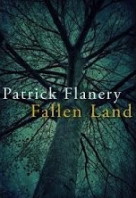This one of the scariest books I’ve read this year and perhaps ever. It’s also one of the cleverest I’ve encountered in recent times at evoking how the American dream can easily turn sour.
Paul Krovik is a property developer who subdivides some acreage, builds his family a model home and gets into debt due to lawsuits. His wife leaves him, takes the children and refuses to answer his calls.
Without his family and without work — and with someone else living in the house he constructed so determinedly — he starts to unravel, living in an underground bunker and hunting for food.
Nathanial, his wife Julia and son Copley move into the Krovik house with some hope that the fresh start will offer them a better life.
Contrary to this, their new home (which is much bigger than their previous dwelling) and their new area (which is alien and forbidding) begin to push their limits.
Their neighbour, Louise, whose grandparents were among the first black people to own land in the area, sees some of what is happening to the family and, particularly, to Copley as its most vulnerable member.
But it’s not enough.
I won’t say anymore about the plot for fear of spoiling the suspense. However, what I will offer is some direct quotes from the book under headings I’ve created to illustrate several issues the book critiques.
The McMansion effect
Nathanial: The house itself will need — will demand — to be filled with new furniture, ornaments and art, and before they know it they’ll be spending their lives decorating and filling up this monstrosity, because unlike some of the sleek, minimalist houses Nathaniel has admired in the past … this house will look vacant unless it is packed to the rafters with a life’s accumulation of stuff. It will demand that they become different people altogether.
Noise pollution and energy consumption
Louise: When Krovik’s house was finished it emitted a humming sound persistent as an idling car. I woke up in hours that should have been quiet to find a buzz of machinery burrowing into my brain.
Fencing each other out and locking ourselves in
Louise: After the fence went up, almost a foot taller than me, I could only see the top two floors and nothing of his backyard. I have never believed in the edict of good fences making good neighbours and Krovik’s stockade fence made me feel I was living in a reproduction fort on a living history farm, wondering when the costumed bandits might come to sack the homestead.
Paul: If it has not already happened, humanity is about to enter a new era, when security will matter more than anything else; not just of person and property but also of food, water, health, medicine, the environment. Security will become the defining quality and concern of human existence on the planet and beyond; to guarantee the long-term security of the human species (if such a thing is desirable), we are going to have to leave the earth.
Over-protected childhoods
Copley: He wonders why they have not met any of the other neighbours and whether there are any children in the neighbourhood, as there were children in their building in Boston, or if he is now going to have a different kind of life altogether, one in which his time outside of school is filled only with adults. He has heard children at school talk about ‘play dates’ and has been able to infer this is the only way children here get together to see each other: they make appointments for designated times and locations, their parents drive and pick them up.
Therapy rather than family love and connection
Nathanial (thinking back to his childhood): At last he was sobbing, his body rigid as his mother stood, arms crossed, never touching him but studying his outburst as if observing an arcane purification rite. “You need to be in therapy,” she said.
Books as decoration rather than education
Paul: Amanda wanted none of the books when she left and at the estate sale Paul sold to the same interior decorator, who purchased them for another client, another model home, in another part of the city. “No one reads books anymore,” the decorator said, “but they’re kind of decorative, and they make good noise insulation in condos.”
Prison populations enslaved
Nathanial: If the idea is to tap prisoners as a free labour force that only has to be housed and fed and regulated by an increasingly technological presence, then perhaps the real goal is not rehabilitation, but the training of an entire group, even a class of people, who will go on reoffending throughout their lives, re-entering a corrections system that exploits their labour potential for the profits of a corporation that manages ever more numerous aspects of life inside and outside the walls of the prison. He has to admit, it has the quality of genius: the criminal class transformed by legal means into the largest body of slave labour since the great emancipation.
Apocalyptic thinking and every man for himself
Paul: The apocalypse he believes is still imminent, perhaps already in the first hours of its unfolding. If we are not in the final chapters of our history then we are at the end of a particular volume, unable to predict how further instalments may unfold. What is certain, he thinks, is that the future will not be one of societies and unions, but of individuals, small family units, fighting to protect their own interests, in the last hours before the ultimate end.
In Fallen Land Patrick Flanery combines great ideas with fine storytelling. This well-written and chilling novel illustrates how patriarchy and capitalism cultivate competitiveness, greed, fear and emotional disconnection and sometimes with devastating effects.




Recent Comments